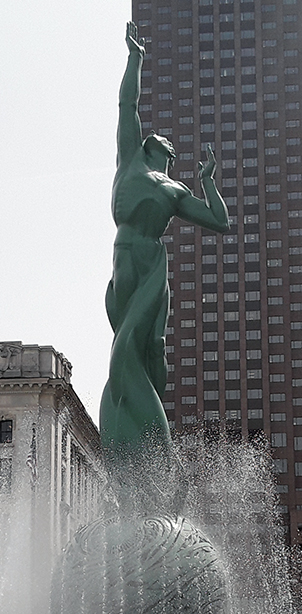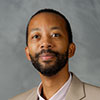This article is more than 5 years old.

From April 10-13, I attended the ACRL 2019 Conference in Cleveland, Ohio. This was my first time attending the conference and visiting Cleveland.
Back in December, I was awarded one of ACRL’s Mid-Career Scholarships to attend the biennial event. This covered registration and hotel costs. For travel, I had the pleasure of carpooling with Mary-Beth, Rosalind and Kyle.
Both the venue and my hotel was just a short walking distance from Lake Erie, which was an awesome sight to see if you have never seen one of the Great Lakes firsthand.
The First-Time Attendee Orientation and Engagement Fair was the first item on the programming that I attended, which occurred that Wednesday evening. This was a great starting point for me, considering the hefty amount of sessions scheduled over the four-day conference. ACRL advertised “more than 500 conference programs.” The panel suggested some effective ways of navigating the conference. They also pointed out fun opportunities to take advantage of, such as meditation areas, yoga sessions, and an art lounge.
My first full day kicked off with the Scholarship Breakfast that Thursday morning. Overall, ACRL awarded a total of 170 recipients. The breakfast included both recipients and donors.
Standout Sessions
Christopher Sweet from Illinois Wesleyan University presented a demonstration of how to use Docfetcher. What is nice about this application is that it can be used to build your own offline research database from emails, notes, and various other documents. It also supports a wide range of file formats.
The panel of the “Publish It with ACRL” session provided awesome information on how to have materials published via the various ACRL publications. The panel featured the editors of ACRL’s publications, and Kaetrena Davis Kendrick, who was awarded ACRL ‘s Academic/Research Librarian of the Year for 2019. Kendrick provided stimulating words to the audience. She encouraged to first think about what you are passionate about, and write about that topic as a key to successful writing.
A session entitled “We Don’t Need that Anymore, Exploring the Realities of the Impact of Digitization on Print Usage,” detailed a study at University of Illinois at Urbana-Champaign that revealed how digitization of printed books affects its circulation rates. The study compared physical books within their library’s holdings and how circulation of these books changed after a digital copy is made available from their holdings within Hathitrust. As likely expected, there was a noticeable decline in average annual use of the physical books. But it was interesting to see the subject areas that were accessed the most digitally. For pre-1924 (public domain) books, Language and Literature were the most accessed subjects. For post-1924 books, History and Geography were the top subjects.
Holly Hendrigan, who is the librarian for the Faculty of Applied Sciences at Simon Fraser University, said that librarians spend a lot of time teaching digital humanities, but “not doing digital humanities for themselves.” She explained how librarians can build a corpus of course outlines from an academic department, and then use Voyant Tools to perform text mining and topic modeling from them. The data from this could be used to effectively determine teaching and learning, and research interests of a department, and also be a guide with collection development.
Keynotes
I was able to see two of the three keynote addresses by author Viet Thanh Nguyen and cartoonist Alison Bechdel. Nguyen talked in detail of his experiences as a Vietnamese American, and also as a refugee when he arrived to the US in 1975 from Vietnam.
The closing keynote was by cartoonist Alison Bechdel. Pulling from several illustrations and passages from her strips and graphic novel, Fun Home: A Family Tragicomic, Bechdel reflected much of her talk about the evolution of her work and the relationship between her father who tragically took his own life.
In closing, this was a great conference. I think the organizers did a great job of putting the conference together. Everything was well presented, and there was more than enough programming to go around. It will be interesting to see what they will have in store for 2021.

6 Comments on ‘ACRL 2019 in Cleveland’
Great write up – the session on “We Don’t Need It Anymore” sounds interesting!
Happy you were able to get to ACRL! The session on librarians using Voyant to text mine/topic model course outlines from departments makes me think there’s potential for collaboration with the TLC around such an approach. Interesting idea!
Sounds like your first ACRL was a good one!
Thanks for sharing — makes me wish I had gone!
Congratulations on the scholarship, Mel! Glad they have a first-timer event, I’ll have to remember that if I attend in the future. Agree with Amanda that “We Don’t Need that Anymore” sounds interesting, both how people use digital resources and how we could use digital more wisely ourselves. Glad you had a successful trip!
You are making me wish I’d gone to the “first timer at ACRL” session back when I was a first timer. (I wonder if they’d let me in if I snuck in before my 6th?)